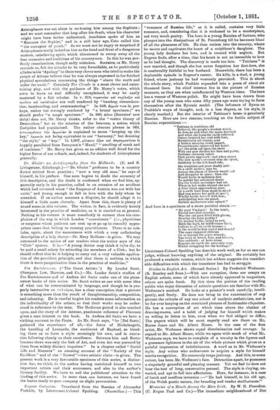"romance of Russian life," as it is called, contains very
little romance, and, considering that it is reckoned to be a masterpiece, not very much poetry. The hero is a young Russian of fortune, who plunges into the dissipations of St. Petersburg till he becomes blasé of all the pleasures of life. He then retires_ into the country, where he meets and captivates the heart of a neighbour's daughter. The young lady declares her love, and is treated with neglect. But Eugene finds, after a time, that his heart is not as insensible to love as he had thought. The discovery is made too late. " Tattiana" is now married, and though she has never forgotten her first-love, she is unalterably faithful to her husband. Meanwhile, there has been a deplorable episode in Eugene's career. He kills, in a duel, a young friend, whose jealousy he had wantonly provoked. This is about the whole story, which Pushkin expanded into a poem of about six thousand lines. Its chief interest lies in the picture of Russian manners, as they are when uninfluenced by Western ideas. The hero has a veneer of Western polish. He might have been drawn from any of the young men who some fifty years ago were trying to form themselves after the Byronic model. (The influence of Byron on Pushkin's ways of thought, and, in a less degree, on his style, is clearly marked.) But the interior of Tattiana's home is genuinely Russian. Here are two stanzas, touching on the fertile subject of Russian superstitions :— " Tattiana in traditions old
Believed, the people's wisdom weird, In dreams and what the moon foretold And what she from the cards inferred. Omens inspired her soul with fear, Mysteriously all objects near A hidden meaning could impart, Presentiments oppressed her heart. Lo! the prim cat upon the stove With one paw strokes her face and parrs, Tattiaua certainly infers That guests approach and when above The new moon's crescent slim she spied, Suddenly to the left-hand side, She trembled and grew deadly pale. Or a swift meteor, may be, Across the gloom of heaven would sail And disappear in space ; then she Would haste in agitation dire To mutter her concealed desire Ere the bright messenger had set. When in her walks abroad she met A friar black approaching near, Or a swift hare from mead to mead Had ran across her path at spew', Wholly beside herself with fear, Anticipating woe she pined„ Certain misfortune near opined."
And here is a specimen of a more poetical strain :— "My poor Vladimir! In the tomb, Passed into dull eternity, Was the sad poet filled with gloom, Hearing the fatal perfidy ?
Or, beyond Lethe, lulled to rest, /lath the bard, by indifference blest, Callous to all on earth become— Is the world to him sealed and dumb? The same unmoved oblivion
On us beyond the grave attends, The voce of lovers, foes, and fnends, Dies suddenly: of heirs alone Remains on earth the unseemly rage, Whilst struggling for the heritage."
Lieutenant-Colonel Spalding has done his work well, as far as one can judge, without knowing anything of the original. He certainly has produced a readable version, which but seldom suggests the consider- able difficulties with which the translator has had to struggle.






























 Previous page
Previous page